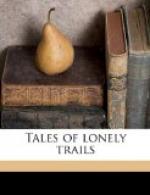Next morning Haught asked me if I would like to ride around through the woods and probably get a shot at a deer. Romer coaxed so to go that I finally consented.
We rode down the canyon, and presently came to a wide grassy park inclosed by high green-clad slopes, the features of which appeared to be that the timber on the west slope was mostly pine, and on the east slope it was mostly spruce. I could arrive at no certain reason for this, but I thought it must be owing to the snow lying somewhat longer on the east slope. The stream here was running with quite a little volume of water. Our horses were grazing in this park. I saw fresh elk tracks made the day before. Elk were quite abundant through this forest, Haught informed me, and were protected by law.
A couple of miles down this trail the canyon narrowed, losing its park-like dimensions. The farther we traveled the more water there was in the stream, and more elk, deer, and turkey tracks in the sand. Every half mile or so we would come to the mouth of a small intersecting canyon, and at length we rode up one of these, presently to climb out on top. At this distance from the rim the forest was more open than in the vicinity of our camp, affording better riding and hunting. Still the thickets of aspen and young pine were so frequent that seldom could I see ahead more than several hundred yards.
Haught led the way, I rode next and Romer kept beside me where it was possible to do so. There was, however, no trail. How difficult to keep the lad quiet! I expected of course that Haught would dismount, and take me to hunt on foot. After a while I gathered he did not hunt deer except on horseback. He explained that cowboys rounded up cattle in this forest in the spring and fall, and deer were not frightened at sound or sight of a horse. Some of the thrill and interest in the forest subsided for me. I did not like to hunt in a country where cattle ranged, no matter how wild they were. Then when we came to a forested ridge bare of grass and smelling of sheep, that robbed the forest of a little more glamour. Mexican sheep-herders drove their flocks up this far sometimes. Haught said bear, lion, lynx, and coyote, sometimes the big gray wolves, followed the sheep. Deer, however, hated a sheep-run range.
Riding was exceedingly pleasant. The forest was shady, cool, full of sunlight and beauty. Nothing but fire or the lumbermen could ever rob it of its beauty, silence, fragrance, and of its temple-like majesty. So provided we did not meet any cattle or sheep I did not care whether or not we sighted any game. In fact I would have forgotten we were hunting had not Romer been along. With him continually seeing things it was difficult to keep from imagining that we were hunting Indians. The Apaches had once lived in this country Haught informed us; and it was a habit of theirs to burn the grass and fallen leaves over every fall, thus keeping down the underbrush. In this the Indians showed how near-sighted they were; the future growth of a forest did not concern them. Usually Indians were better conservationists than white men.




